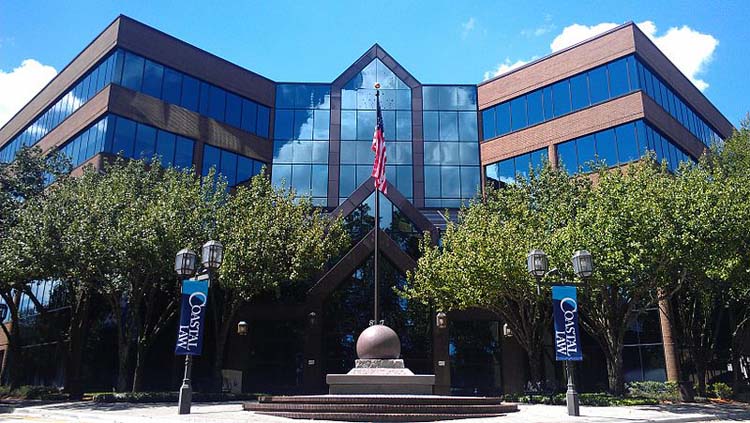Last InfiLaw school seeks nonprofit status from ABA's legal ed section

Florida Coastal School of Law. Photo by Waters2100/Wikimedia Commons.
The Florida Coastal School of Law, one of the three for-profit InfiLaw campuses that sued the American Bar Association regarding accreditation matters, and the only one that has not closed or is in the process of closing, is now seeking nonprofit status.
Notice of the law school’s application for substantive change is posted on the ABA’s Section of Legal Education and Admissions to the Bar website. The section’s council found in 2018 that the law school was out of compliance with two standards regarding education programs, and Standard 501, which deals with admissions.
Florida Coastal is on the list of ABA-approved law schools, and it remains subject to published notices that it is operating out of compliance on specific standards, said Barry Currier, the ABA’s managing director of accreditation and legal education, in a statement.
“The school has been directed to take specific remedial action to demonstrate that it has come back into compliance with those standards. The school’s accreditation remains in place while the review processes are continuing,” according to the statement.
Currier said in his statement that a change in tax status is somewhat rare for law schools. Previously, the Western State College of Law at Argosy University and the Thomas Jefferson School of Law converted from for-profit to nonprofit status, and the review process usually takes six to 12 months, according to Currier.
“Under ABA procedures, the managing director’s office will send a fact-finder or fact-finding team to the school to review the matter and file a report. The school has an opportunity to review and comment on the report before the matter is considered by the council of the ABA Section of Legal Education and Admissions to the Bar,” Currier said.
The law school is working with its parent company, InfiLaw, to ensure the process “moves forward as smoothly and quickly as possible,” according to a press release.
“We’ve improved our entry credentials. We’ve improved our bar passage results. So that’s part of why this is now the time to do it,” Scott DeVito, the school’s dean, told Inside Higher Ed.
According to Florida Coastal’s 509 Report for 2018, its median LSAT score is 150; the median undergraduate GPA is 3.14. The document showed a total of 207 students. The law school’s most recent ultimate bar-passage rate for the class of 2015 is 72.08 percent, according to ABA data. For the July 2018 Florida bar exam, the law school had a pass rate of 62.5 percent, according to data from the Florida Board of Bar Examiners.
In January 2017, DeVito told the Florida Times-Union that the law school planned to seek nonprofit status. Also in January 2017, the law school was included on the Department of Education’s list of for-profit schools that were not meeting the agency’s gainful employment standard, which measures debt-to-earnings ratios and puts some schools in danger of losing federal funding. In August 2018, the department announced that it planned to eliminate the regulation July 1, the New York Times reported.
The Charlotte School of Law, one of the three InfiLaw schools, closed in August 2017, after the ABA’s legal ed section placed the school on probation and rejected its teach-out plan. Its federal lawsuit against the ABA remains open as does Florida Coastal’s. The legal ed section’s council approved a teach-out plan from the Arizona Summit Law School, the third InfiLaw school, which also was on probation, in November 2018. The school settled its lawsuit with the ABA in last month.



